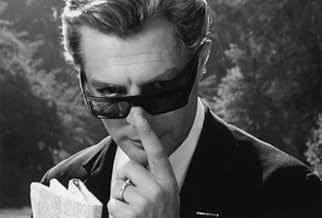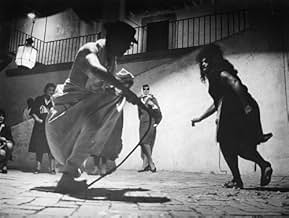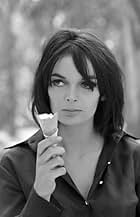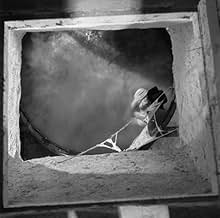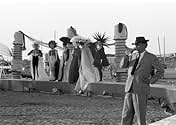A harried movie director retreats into his memories and fantasies.A harried movie director retreats into his memories and fantasies.A harried movie director retreats into his memories and fantasies.
- Won 2 Oscars
- 19 wins & 9 nominations total
Anouk Aimée
- Luisa Anselmi
- (as Anouk Aimee)
Eddra Gale
- La Saraghina
- (as Edra Gale)
Featured reviews
Fellini's films is one of the main reasons I came to love movies in the first place. I first saw 8 1/2 several years ago. I remember it quite clearly: I went to see it with a small group of fellow students at a friend's house. It was at the beginning of a now already long-since destroyed relationship. It was a cold day in early January. As the film started, a girl who was there, who happened to be a make-up artist and hairdresser by profession, remarked on the odd juxtaposition in the opening scenes of hair-styles and dresses from different eras, the 30's and the 60's. Surely, this was a strange anachrony?
My friend calmly remarked: "Time doesn't exist."
Heck, I won't pretend to know just what he meant by that, perhaps it wasn't as profound as it sounded. In any case, after that, no one spoke. For the next couple of hours, I certainly lost track of place and time, as I was hypnotized, mesmerized and amazed by the images on the screen. Since then, I've always kept a copy of it within reach (even though I am one of those people who can usually never hang on to my possessions for any length of time), and it has lost none of its power to continually amaze me. I've seen it more times than I can count, and yet, it must always be seen again. It's a movie about which everything seems to have been said, and yet, everything still remains to be said. Thanks to the wonders of DVDs and MPEG encoding, I can keep it one mouse-click away whenever I'm working on my computer. I must admit that by now, its already from the outset discontinuous and jumbled content has been spread all over the place for me. Unlike Woody Allen, I'm not anal. I've never had a compulsion to have to watch movies straight from beginning to end, without interruptions. Of course, that's how I watched 8 1/2 the first few times, but now it seems that I'm always chopping it up, skipping at will between my favorite sections, always moving around it and rearranging it in new and unexpected ways. I hope Fellini, in his Heaven, forgives me for it, because it seems to me that I'm in a way just continuing what he began. 8 1/2, even in its purest state, does of course blow the traditional temporal narrative, with a defined beginning, middle and end and a causal relationship between its parts, to complete smithereens, and in the jumbled landscape that is left behind, nothing can ever be as it was before, as what we are left with is a completely new world, of new possibilities and new kinds of beauty. It's a story of dream-logic, held together by different kinds of connections that transcend temporal sequence and causal relationships. It's a film that never begins, and still has always been there.
It's a movie about the most glorious success that can only be brought around through complete failure. It's about how we can only find ourselves when we let go of ourselves - and discover that the only place we can fall is into ourselves, our true selves. It's the ultimate self-referential masterpiece, and the ultimate piece of self-reference, as it is, of course, about nothing except itself.
It really is, in my opinion, the best movie in the world, and by now I can't even imagine a world without it. That's really all I want to say.
My friend calmly remarked: "Time doesn't exist."
Heck, I won't pretend to know just what he meant by that, perhaps it wasn't as profound as it sounded. In any case, after that, no one spoke. For the next couple of hours, I certainly lost track of place and time, as I was hypnotized, mesmerized and amazed by the images on the screen. Since then, I've always kept a copy of it within reach (even though I am one of those people who can usually never hang on to my possessions for any length of time), and it has lost none of its power to continually amaze me. I've seen it more times than I can count, and yet, it must always be seen again. It's a movie about which everything seems to have been said, and yet, everything still remains to be said. Thanks to the wonders of DVDs and MPEG encoding, I can keep it one mouse-click away whenever I'm working on my computer. I must admit that by now, its already from the outset discontinuous and jumbled content has been spread all over the place for me. Unlike Woody Allen, I'm not anal. I've never had a compulsion to have to watch movies straight from beginning to end, without interruptions. Of course, that's how I watched 8 1/2 the first few times, but now it seems that I'm always chopping it up, skipping at will between my favorite sections, always moving around it and rearranging it in new and unexpected ways. I hope Fellini, in his Heaven, forgives me for it, because it seems to me that I'm in a way just continuing what he began. 8 1/2, even in its purest state, does of course blow the traditional temporal narrative, with a defined beginning, middle and end and a causal relationship between its parts, to complete smithereens, and in the jumbled landscape that is left behind, nothing can ever be as it was before, as what we are left with is a completely new world, of new possibilities and new kinds of beauty. It's a story of dream-logic, held together by different kinds of connections that transcend temporal sequence and causal relationships. It's a film that never begins, and still has always been there.
It's a movie about the most glorious success that can only be brought around through complete failure. It's about how we can only find ourselves when we let go of ourselves - and discover that the only place we can fall is into ourselves, our true selves. It's the ultimate self-referential masterpiece, and the ultimate piece of self-reference, as it is, of course, about nothing except itself.
It really is, in my opinion, the best movie in the world, and by now I can't even imagine a world without it. That's really all I want to say.
Frederico Fellini's masterwork 8 ½ is difficult to approach largely because of its reputation. Many critics also state that the film is so complex that it requires multiple viewings to understand, and this is likely to intimidate many viewers. But in truth, and in spite of its surrealistic flourishes, 8 ½ is more straight-forward than its reputation might lead you to believe.
The storyline itself is very simple. A famous director is preparing a new film, but finds himself suffering from creative block: he is obsessed by, loves, and feels unending frustration with both art and women, and his attention and ambition flies in so many different directions that he is suddenly incapable of focusing on one possibility lest he negate all others. With deadlines approaching the cast and crew descend upon him demanding information about the film--information that the director does not have because he finds himself incapable of making an artistic choice.
What makes the film interesting is the way in which Fellini ultimately transforms the film as a whole into a commentary on the nature of creativity, art, mid-life crisis, and the battle of the sexes. Throughout the film, the director dreams dreams, has fantasies, and recalls his childhood--and this internal life is presented on the screen with the same sense of reality as reality itself. The staging of the various shots is unique; one is seldom aware that the characters have slipped into a dream, fantasy, or memory until one is well into the scene, and as the film progresses the lines between external life and internal thought become increasingly blurred, with Fellini giving as much (if not more) importance to fantasy as to fact.
The performances and the cinematography are key to the film's success. Even when the film becomes surrealistic, fantastic, the actors perform very realistically and the cinematography presents the scene in keeping with what we understand to be the reality of the characters lives and relationships. At the same time, however, the film has a remarkably poetic quality, a visual fluidity and beauty that transforms even the most ordinary events into something slightly tinged by a dream-like quality. Marcello Mastroianni offers a his greatest performance here, a delicate mixture of desperation and ennui, and he is exceptionally well supported by a cast that includes Claudia Cardinale, Anouk Aimee, and a host of other notables.
I would encourage people not to be intimidated by the film's reputation, for its content can be quickly grasped. When critics state the film requires repeated viewing what they actually seem to mean is that the film holds up extremely well to repeated viewing; each time it is seen, one finds more and more to enjoy and to contemplate. Even so, I would be amiss if I did not point out that people who prefer a cinema of tidy plot lines and who dislike ambiguity or the necessity of interpreting content will probably dislike 8 ½ a great deal. For all others: strongly, strongly recommended.
Gary F. Taylor, aka GFT, Amazon Reviewer
The storyline itself is very simple. A famous director is preparing a new film, but finds himself suffering from creative block: he is obsessed by, loves, and feels unending frustration with both art and women, and his attention and ambition flies in so many different directions that he is suddenly incapable of focusing on one possibility lest he negate all others. With deadlines approaching the cast and crew descend upon him demanding information about the film--information that the director does not have because he finds himself incapable of making an artistic choice.
What makes the film interesting is the way in which Fellini ultimately transforms the film as a whole into a commentary on the nature of creativity, art, mid-life crisis, and the battle of the sexes. Throughout the film, the director dreams dreams, has fantasies, and recalls his childhood--and this internal life is presented on the screen with the same sense of reality as reality itself. The staging of the various shots is unique; one is seldom aware that the characters have slipped into a dream, fantasy, or memory until one is well into the scene, and as the film progresses the lines between external life and internal thought become increasingly blurred, with Fellini giving as much (if not more) importance to fantasy as to fact.
The performances and the cinematography are key to the film's success. Even when the film becomes surrealistic, fantastic, the actors perform very realistically and the cinematography presents the scene in keeping with what we understand to be the reality of the characters lives and relationships. At the same time, however, the film has a remarkably poetic quality, a visual fluidity and beauty that transforms even the most ordinary events into something slightly tinged by a dream-like quality. Marcello Mastroianni offers a his greatest performance here, a delicate mixture of desperation and ennui, and he is exceptionally well supported by a cast that includes Claudia Cardinale, Anouk Aimee, and a host of other notables.
I would encourage people not to be intimidated by the film's reputation, for its content can be quickly grasped. When critics state the film requires repeated viewing what they actually seem to mean is that the film holds up extremely well to repeated viewing; each time it is seen, one finds more and more to enjoy and to contemplate. Even so, I would be amiss if I did not point out that people who prefer a cinema of tidy plot lines and who dislike ambiguity or the necessity of interpreting content will probably dislike 8 ½ a great deal. For all others: strongly, strongly recommended.
Gary F. Taylor, aka GFT, Amazon Reviewer
I certainly wouldn't be saying anything new if I said that "8 1/2" is one of the most unique, fascinating, and personal pieces ever committed to film. It has consistently hailed as such, and its influence on film is far reaching and undeniable. It is certainly not one of the most entertaining movies of all time, and is actually quite long and difficult. But it is an incredible piece of filmmaking, and a gripping look at the difficulties of creating not just a movie, but art in general.
Guido (Marcello Mastroianni) is a popular movie director who is working on his new film. Along the way, he struggles with his screenwriter, producer, wife, and mistress. Each presents a different problem and obstacle. More and more difficulties arise, not just in his attempts to complete the movie, but in his own mind.
Guido, although flawed, is completely fleshed out, and draws sympathy from the audience. Yes, he is an adulterer, but he loves his wife. We see all of his personal desires and agony. We see how he suffers when he struggles with his desire to create the ultimate piece of art, one that offers something to everybody.
The movie is technically wonderful. The movement of the camera, the lighting, and the direction in general is top notch. The movie mixes in dreams with reality to create a dreamlike world, and put us closer into Guido's own mind.
Somebody who is looking for a movie as a two hour piece of entertainment will not enjoy this. But if you enjoy a movie that truly satisfies when it is finished, this is for you. It is quite long, and somewhat loose, but that is part of the interest. Moviemakers, or artists in general, will find that this film has a great deal to offer.
Guido (Marcello Mastroianni) is a popular movie director who is working on his new film. Along the way, he struggles with his screenwriter, producer, wife, and mistress. Each presents a different problem and obstacle. More and more difficulties arise, not just in his attempts to complete the movie, but in his own mind.
Guido, although flawed, is completely fleshed out, and draws sympathy from the audience. Yes, he is an adulterer, but he loves his wife. We see all of his personal desires and agony. We see how he suffers when he struggles with his desire to create the ultimate piece of art, one that offers something to everybody.
The movie is technically wonderful. The movement of the camera, the lighting, and the direction in general is top notch. The movie mixes in dreams with reality to create a dreamlike world, and put us closer into Guido's own mind.
Somebody who is looking for a movie as a two hour piece of entertainment will not enjoy this. But if you enjoy a movie that truly satisfies when it is finished, this is for you. It is quite long, and somewhat loose, but that is part of the interest. Moviemakers, or artists in general, will find that this film has a great deal to offer.
What can anyone say about this film? It's one of a kind, and simple words can't really describe it.
The famous Italian director Federico Fellini presents us the journey of the highly surrealistic thoughts of a filmmaker, who suffers from, what we could call, Director's block. The protagonist, who seems constantly tired, is surrounded by many different people, friends, associates, priests and mostly... women; struggling with his weird fantasies of the current events of his life and memories of his childhood. All of these scenes take place in many different phantasmagoric sets, where multiple, for the most part random, conversations occur simultaneously, making him continually engaged and, in a way, frustrated.
The production design is exceptional, with huge sets and dreamlike settings, while the cinematography (Fellini's last black and white film) is very unique and teases the viewer with alternate focusing and artsy compositions. The music theme is for the most part classical symphonies from Tchaikovsky, Wagner and Chopin, beautifully edited with the rhythm of the film.
This is a drama with many subtle doses of comedy and a surreal analysis of the thoughts, relationships, affairs, fears, dreams and memories of the protagonist. Some viewers can find a bit annoying the randomness of the script and editing, where mostly unexplained things occur, but others can completely immerse in this insane trip and fully enjoy it.
If you've seen some movies of Charlie Kaufman, a good explanation of what to expect is a wedding between Adaptation and Synecdoche, New York. If you haven't seen any of those, then you can go ahead and experience something you've never had before!
The famous Italian director Federico Fellini presents us the journey of the highly surrealistic thoughts of a filmmaker, who suffers from, what we could call, Director's block. The protagonist, who seems constantly tired, is surrounded by many different people, friends, associates, priests and mostly... women; struggling with his weird fantasies of the current events of his life and memories of his childhood. All of these scenes take place in many different phantasmagoric sets, where multiple, for the most part random, conversations occur simultaneously, making him continually engaged and, in a way, frustrated.
The production design is exceptional, with huge sets and dreamlike settings, while the cinematography (Fellini's last black and white film) is very unique and teases the viewer with alternate focusing and artsy compositions. The music theme is for the most part classical symphonies from Tchaikovsky, Wagner and Chopin, beautifully edited with the rhythm of the film.
This is a drama with many subtle doses of comedy and a surreal analysis of the thoughts, relationships, affairs, fears, dreams and memories of the protagonist. Some viewers can find a bit annoying the randomness of the script and editing, where mostly unexplained things occur, but others can completely immerse in this insane trip and fully enjoy it.
If you've seen some movies of Charlie Kaufman, a good explanation of what to expect is a wedding between Adaptation and Synecdoche, New York. If you haven't seen any of those, then you can go ahead and experience something you've never had before!
Fellini's 8 1/2 opens with a stunning dream sequence in which a man is trapped in his car in the middle of a traffic jam. The doors and windows are locked and there is no escape. Other drivers simply sit and stare at him passively. The driver starts to panic as smoke begins to build up within the car. Propelling himself outside a window, he floats over the other cars and soars above the world until he is pulled down a rope attached to a tether on his ankle. The driver is Guido Anselmi (Marcello Mastroianni), a film director at odds with himself. Shot in black and white, 8 1/2 is an exhilarating, confusing, irritating, and inspired journey into a man's consciousness. It is not just a look at the inner turmoil of one person, but also a commentary on each person's struggle to make sense of their life. The film's combination of kaleidoscopic images, evocative score by Nino Rota, and amazing performances ensure its place as one of the greatest films of the century.
Guido is preparing to shoot a new film with an expensive budget. He constructs a huge spaceship launch pad that costs $80 million but he is unsure of what he wants to say. Guido's dishonesty in dealing with his marriage, his career, and the fact that he really does not want to make the film forces him to falsely mislead people as to his true intentions. He feels like a failure and is physically spent. He checks into a spa to restore his health and well being but the contingent of producers, actors, writers, and hangers on undermine his strength. His feeling of being overwhelmed by personal and professional obligations provides the catalyst for dreams and fantasies that take him back to his childhood.
Fellini shows his encounter with the prostitute Saraghina (Eddra Gale) and the guilt he has to deal with in a confrontation with the Catholic Church. Guido invites his intellectual wife Luisa (Anouk Aimée) to the set but their relationship has turned cold and passionless, and sparks fly when she has to confront Carla (Sandra Milo), his buxom mistress. Guido is misguided but he has an innocence and charm that allows us to overlook his indulgences. He enjoys his pleasures but has a conscience and feels guilty about cheating on Luisa whom he loves and is afraid of losing. He fantasizes that all of the women in his life are together in a harem where they all dote on his every whim. When they finally recognize how little he cares about them, he is forced to suppress their revolt.
As image piles on image and the fantasy becomes indistinguishable from the reality, the viewer may get lost in a maze of dazzling incoherence. Fellini, however, always returns to solid ground and the film offers not only a satire on the frenzy, the uncertainty, and the clash of egos involved with making a film but also a serious commentary on the importance of honesty in a relationship. If 8 1/2 is occasionally exhausting, the ending is invigorating, letting us know that life is a game in which each of us is on the stage performing our roles and the only sane response to its turmoil is to join hands in love and celebrate the moment.
Guido is preparing to shoot a new film with an expensive budget. He constructs a huge spaceship launch pad that costs $80 million but he is unsure of what he wants to say. Guido's dishonesty in dealing with his marriage, his career, and the fact that he really does not want to make the film forces him to falsely mislead people as to his true intentions. He feels like a failure and is physically spent. He checks into a spa to restore his health and well being but the contingent of producers, actors, writers, and hangers on undermine his strength. His feeling of being overwhelmed by personal and professional obligations provides the catalyst for dreams and fantasies that take him back to his childhood.
Fellini shows his encounter with the prostitute Saraghina (Eddra Gale) and the guilt he has to deal with in a confrontation with the Catholic Church. Guido invites his intellectual wife Luisa (Anouk Aimée) to the set but their relationship has turned cold and passionless, and sparks fly when she has to confront Carla (Sandra Milo), his buxom mistress. Guido is misguided but he has an innocence and charm that allows us to overlook his indulgences. He enjoys his pleasures but has a conscience and feels guilty about cheating on Luisa whom he loves and is afraid of losing. He fantasizes that all of the women in his life are together in a harem where they all dote on his every whim. When they finally recognize how little he cares about them, he is forced to suppress their revolt.
As image piles on image and the fantasy becomes indistinguishable from the reality, the viewer may get lost in a maze of dazzling incoherence. Fellini, however, always returns to solid ground and the film offers not only a satire on the frenzy, the uncertainty, and the clash of egos involved with making a film but also a serious commentary on the importance of honesty in a relationship. If 8 1/2 is occasionally exhausting, the ending is invigorating, letting us know that life is a game in which each of us is on the stage performing our roles and the only sane response to its turmoil is to join hands in love and celebrate the moment.
Did you know
- Trivia8½ (1963) was shot, like almost all Italian movies at the time, completely without sound recording on set. All dialogue was dubbed during post production. Federico Fellini was known for shouting direction at his actors during shooting, and for rewriting dialogue afterwards, making a lot of the dialogue in the movie appear out-of-sync. (Source: High-def Digest)
- GoofsWhen Guido visits the cardinal in the mud bath, the cardinal is sitting in a chair, fully dressed in his cassock, as two attendants use a sheet to form a curtain around him; however, as the camera cuts to a closer angle, the cardinal is suddenly undressed to the waist.
- Quotes
Claudia: I don't understand. He meets a girl that can give him a new life and he pushes her away?
Guido: Because he no longer believes in it.
Claudia: Because he doesn't know how to love.
Guido: Because it isn't true that a woman can change a man.
Claudia: Because he doesn't know how to love.
Guido: And above all because I don't feel like telling another pile of lies.
Claudia: Because he doesn't know how to love.
- Alternate versionsIn the American theatrical release version, Rodgers & Hart's "Blue Moon" can be heard twice: the first time, when it's played by strolling strings near the shopping plaza where Guido meets up with his wife, Luisa; the second time, when Guido goes out for a drive with the "real" Claudia. However, in the original Italian release, the song played in both scenes is "Sheik of Araby." The Criterion laserdisc features "Blue Moon," but it's "Sheik of Araby" on the DVD, possibly due to the use of different source materials.
- ConnectionsEdited into Bellissimo: Immagini del cinema italiano (1985)
Details
- Release date
- Countries of origin
- Official sites
- Languages
- Also known as
- Federico Fellini's 8½
- Filming locations
- Tivoli, Rome, Lazio, Italy(location)
- Production companies
- See more company credits at IMDbPro
Box office
- Gross US & Canada
- $245,681
- Opening weekend US & Canada
- $11,947
- Apr 11, 1999
- Gross worldwide
- $347,423
- Runtime
- 2h 18m(138 min)
- Color
- Sound mix
- Aspect ratio
- 1.85 : 1
Contribute to this page
Suggest an edit or add missing content





